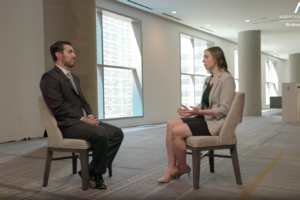CURRENT MONTH (August 2023)
Words Matter! “Court-Appointed Neutral”: A Better Name for Special Master and New Rules for Their Work
By Merril Hirsh
At the ABA Annual Meeting on August 7, 2023, the House of Delegates overwhelmingly adopted two resolutions co-sponsored by the Judicial Division and the Section of Dispute Resolution and supported by the Business Law Section. The first resolution encourages the use of a new term—“court-appointed neutrals”—to refer to what many people have called “masters” or “special masters”. The second resolution proposes a new court rule to harmonize and expand the ways in which these neutrals can support the effective administration of justice, for the benefit of courts and parties alike.
Resolution 516, among other things, urges rule-makers and legislators to substitute the term “court-appointed neutrals” for “master” or “special master,” and amends the ABA’s own 2019 Guidelines on the Appointment and Use of Special Masters in Federal and State Civil Litigation to substitute this new term.
Separately, Resolution 517 urges states, localities, territories and tribal courts to adopt a new Model Rule of Civil Procedure on the Appointment and Use of Court-Appointed Neutrals. In addition to providing standards and procedures for making use of court-appointed neutrals, the Model Rule harmonizes the existing myriad of state rules concerning the term used to describe this role in the legal profession.
In adopting these Resolutions, the ABA joins the National Association of Women Judges and three states—Maryland, Pennsylvania, and Delaware—in seeking to modernize and improve the terminology that is used to refer to a neutral, disinterested person appointed by a court to help with the administration and management of a complex case. As the Report accompanying Resolution 516 explains, these words matter. The term “court-appointed neutral” does a far better job of describing the wide-ranging roles that these individuals undertake in service to courts, counsel, parties, and the justice system. And in removing the taint that some find to be associated with the idea of “masters,” the new term also better serves the fair and impartial administration of justice.
Of course, adopting these resolutions brings one process to closure, as this is now ABA policy. But the next step is just beginning, and efforts are already underway to introduce the term “court-appointed neutral” into court rules, administrative orders, and common usage in the profession. And with the Model Rule, this is also an opportunity not just to standardize the nomenclature, but also to revisit and discuss all the ways that courts and parties can most effectively use this tool. The Business Law Section continues to be active in working on these matters, and those with an interest and ideas about next steps may contact the author, Merril Hirsh, [email protected], to become involved.
The Eleventh Circuit Joins the Majority of Circuits in Finding Grounds to Vacate a Non-Domestic Arbitration Award under the FAA
By Leslie A. Berkoff, Partner and Chair of Dispute Resolution Department, Moritt Hock & Hamroff LLP
In Corporación AIC, SA v. Hidroeléctrica Santa Rita S.A., the Eleventh Circuit Court of Appeals, sitting en banc, issued a decision determining that the grounds for vacating an arbitration award under Chapter 1 of the Federal Arbitration Act (“FAA”) should also be applied to vacate a nondomestic arbitration award; nondomestic arbitration awards are those awards rendered in the U.S. that involve a non-U.S. based party. By rendering this decision, the Eleventh Circuit overruled prior rulings within its own circuit holding that Article V of the New York Convention and Chapter 2 of the FAA provided the exclusive grounds for challenging the enforcement of a nondomestic arbitration award. As a result of this decision, the Eleventh Circuit resolved a circuit split, joining the Second, Third, Fifth, Sixth, Seventh, Ninth, Tenth, and D.C. circuits—all of which found that Section 10 of Chapter 1 of the FAA governs vacatur.
Section 10 of Chapter 1 of the FAA sets forth four reasons for vacating an arbitral award: (1) the award was procured by corruption, fraud, or undue means; (2) there was evident partiality or corruption in the arbitrators; (3) the arbitrators were guilty of misconduct in the manner in which the hearing was conducted or evidence presented; or (4) the arbitrators exceeded their powers or imperfectly executed them so that a mutual, final, and definite award upon the subject matter submitted was not made. In contrast, Chapter 2 of the FAA sets forth grounds to refuse “the recognition and enforcement” of arbitral awards.
Generally, it is undisputed that the “vacatur” grounds in Chapter 1 of the FAA applied to domestic arbitration proceedings, but there has been disagreement concerning the application of Chapter 1’s “vacatur” standards to nondomestic awards. Until the Eleventh Circuit issued its recent decision, the Eleventh Circuit was the only circuit that looked to Chapter 2 of the FAA for challenging a nondomestic award. In Corporación AIC, the Eleventh Circuit acknowledged that its prior rulings had mistakenly “equated the defenses to recognition and enforcement [laid out in Chapter 2 of the FAA] with the grounds for vacatur” and that these prior decisions were “plainly and palpably wrong.” Id. at 888. The Court went on to find that the terms “recognition, confirmation, and enforcement” “seek to give effect to an arbitral award, while vacatur challenges the validity of the award and seeks to have it declared null and void.” Id. at 883.
Up until this holding the Eleventh Circuit had been the only circuit ruling that a party’s ability to challenge the enforcement of a nondomestic award was controlled by the standards set out in Article V of the New York Convention (and Chapter 2 of the FAA)—not Chapter 1 of the FAA. As a result, a fair number of foreign parties had previously selected the Eleventh Circuit as the seat of their arbitration. The change in the circuit’s position will leave many reconsidering choices of an arbitral seat going forward.








